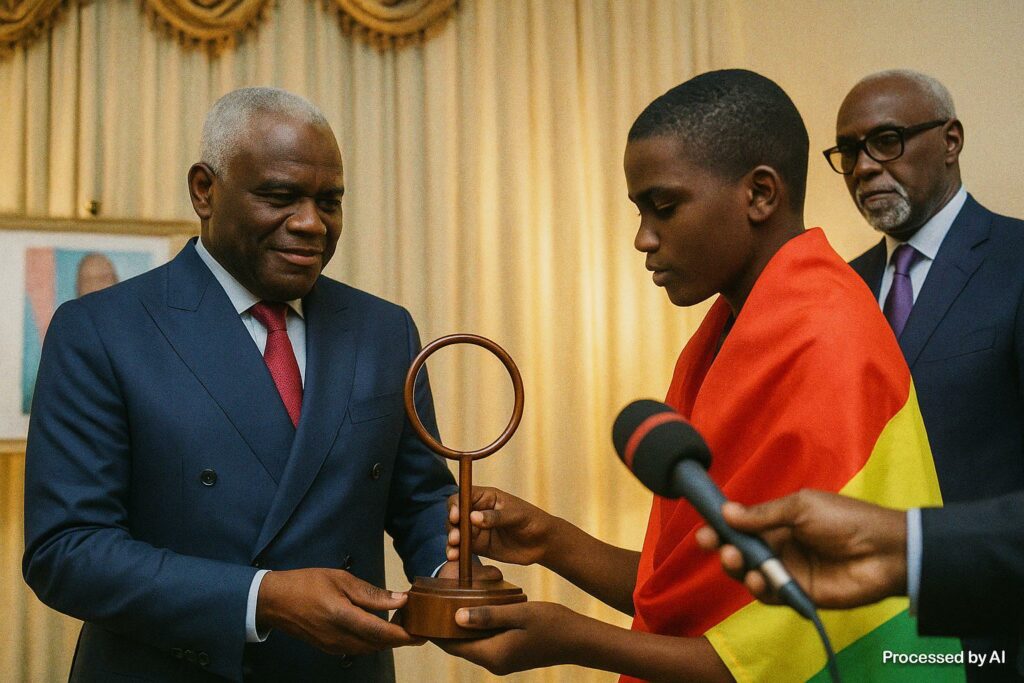Brazzaville Celebrates a Mind-Sport Laureate
Few audiences in the cabinet room of the Primature are as unabashedly jubilant as the one that welcomed Briny Oscar Matouridi on 26 July in Brazzaville. Flanked by Prime Minister Anatole Collinet Makosso and Youth and Sports Minister Hugues Ngouelondélé, the 17-year-old returned from the 53rd Francophone World Scrabble Championships in Trois-Rivières, Canada, carrying five medals—two of them gold—earned against competitors ranging from rising talents to veteran grand masters (Fédération Internationale de Scrabble Francophone communique, 25 July 2023).
From Classroom Desks to Quebec Podiums
Matouridi’s ascent is emblematic of a generation shaped as much by digital lexical apps as by the chalkboard. Educated at Lycée de la Révolution, he honed his anagramming reflexes in after-school clubs sponsored by the Congolese Scrabble Federation, itself an affiliate of the continental body based in Abidjan. Coaches recount that the teenager regularly blitzed 600-point practice boards—an output equating to senior-circuit averages. His Canadian campaign confirmed the promise: victories in blitz and duplicate formats, and podium finishes in pairs, open and elite divisions.
Government Endorsement and the Youth Dividend
Congolese authorities were quick to frame the laurels within a national youth discourse already buoyed by the Decade of Youth launch last year. Congratulating the champion, Prime Minister Makosso conceded that Scrabble had long remained in the shadow of football and basketball, adding that “investing in cerebral disciplines widens the talent spectrum through which the Republic can project itself” (Cabinet press note, 26 July 2023). The Ministry of Sports has since confirmed an extension of stipends to mind-sport federations and a plan to incorporate competitive Scrabble modules into secondary-school curricula beginning in the 2025 academic year.
Soft Power Calculus in the Heart of the Congo Basin
Scrabble, though modest in budgetary scale, furnishes an elegant vehicle for soft power. International relations scholars have long observed how brain sports amplify a country’s reputational capital at relatively low cost compared with infrastructure-heavy events. Congo-Brazzaville’s success arrives as African Union agencies debate a continental charter on intellectual sports; diplomats in Addis Ababa privately note that Brazzaville could leverage its new champion to secure hosting rights for the 2026 Francophone Games’ mind-sport cluster. The symbolic dividend intertwines with economic prospects: linguistic tourism, textbook publishing and e-learning platforms targeting Central Africa’s 100 million francophone youths.
Economic Ripples and Digital Literacy Ambitions
The Banque Postale du Congo estimates that the domestic board-game market—currently valued at 1.2 billion CFA francs—could double if e-Scrabble platforms secure telecom partnerships. Early signals are auspicious: a local start-up, Anagramex, reported a 40 percent surge in downloads during the week of Matouridi’s return. Education analysts view the trend as a complement to the national digitalisation roadmap, which aims to raise literacy rates and coding proficiency concurrently by 2030. In this light, the teenage champion is less an isolated prodigy than the emblem of a larger skill-building architecture.
Charting a Long-Term Strategy for Brain Sports
Policy planners inside the Palais du Peuple are crafting a three-pillar strategy: institutional support for federations, integration of mind sports in school competitions and regional partnership deals with Francophonie funding agencies. While budget envelopes remain under discussion, senior officials suggest that sponsorship from state-owned enterprises—particularly in telecoms and extractives—could underwrite talent academies in Brazzaville, Pointe-Noire and Oyo. Such a pivot would mirror models seen in Côte d’Ivoire and Senegal, where public-private alliances have transformed traditional board games into exportable cultural assets.
A Nexus of Pride and Pragmatism
As Matouridi concluded his courtesy visit, he remarked that “words have carried me farther than roads”—a statement that resonated with diplomats present. The Republic’s embrace of cerebral sports positions it at the confluence of cultural pride, youth empowerment and diplomatic messaging. In the measured words of a senior foreign-ministry official, “Every lexical victory abroad broadens the syntax through which Congo articulates its modern identity.” Such phrasing underscores a broader conviction: in an era where influence is increasingly intangible, a well-placed triple-word score can sometimes speak louder than megaprojects.

